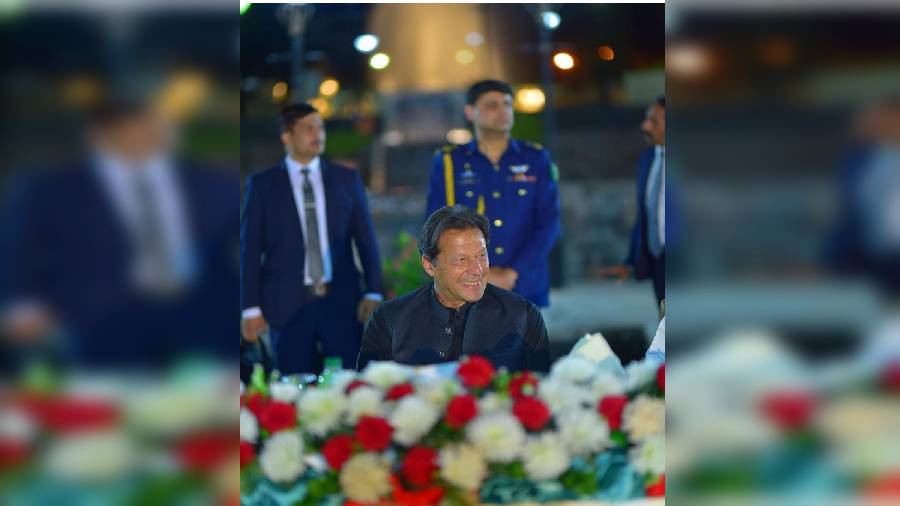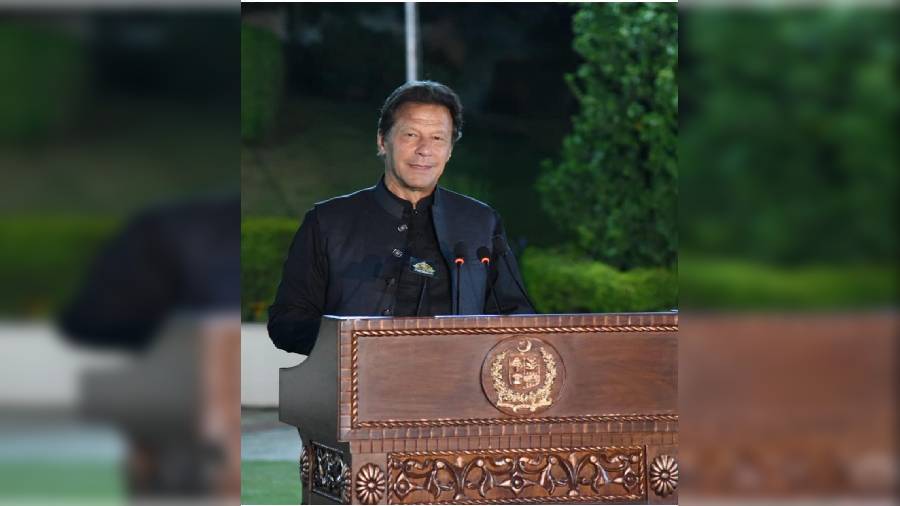Pakistan National Assembly Deputy Speaker Qasim Khan Suri on Sunday dismissed a no-trust motion against embattled Prime Minister Imran Khan, terming it against Article 5 of the Constitution. Based on the recommendation of Khan, Pakistan President Arif Alvi dissolved the National Assembly, minutes after the former advised him to call for fresh elections.
Minister of State for Information and Broadcasting Farrukh Habib said that President Alvi has dissolved the National Assembly as per the advice of the prime minister. He said the election will be held within 90 days. Information Minister Fawad Chaudhry said that the Cabinet has been dissolved.
Addressing the nation soon after the no-confidence motion was rejected, Khan said, "I congratulate every Pakistani on the Deputy Speaker’s decision. The no-confidence motion was a foreign conspiracy against us. Pakistan should decide who should govern them," he added.
The Opposition vowed to fight the block, made by Suri of Khan's Pakistan Tehreek-e-Insaf (PTI), added Reuters. In fact, they have decided to challenge the decision in the Supreme Court.
"We will stage a sit-in at the National Assembly (parliament). We are also moving to the Supreme Court today," Bilawal Bhutto Zardari, head of the opposition Pakistan People's Party (PPP), told reporters.
Suri chaired the crucial session after Opposition parties filed a no-confidence motion against Speaker Asad Qaiser.
Opposition lawmakers, who earlier appeared confident of the success of the no-trust move as they made their way to Parliament House, protested against the decision.
The Opposition parties needed 172 members of the 342-member National Assembly to orchestrate the defeat of Khan and had claimed the support of 177 members, more than the needed strength to oust the prime minister.
The combined Opposition filed the no-confidence motion on March 8, setting a set of events leading to the day of voting and rise in the tension due to Khan's insistence that he was being targeted as part of the foreign conspiracy with the collaboration of top opposition leaders.
Khan, 69, on Saturday issued a call to the followers of his Pakistan Tehreek-e-Insaf (PTI) party, especially the youth, to hold peaceful protests on the day of voting to reject the conspiracy and assembly proceeding to topple the government.
He earlier described the rebel lawmakers as "traitors" and said that they will be branded as such for the rest of their lives as he pleaded with them to come back and foil the Opposition's attempt to topple his government.
Khan, who had earlier asked his party lawmakers not to attend the no-confidence session, has now ordered them to participate in the proceedings and mount a vociferous defence of their prime minister.
Khan, who came to power in 2018 with promises to create a Naya Pakistan', is at a critical juncture of his political career as he has lost majority after defection from his PTI party. Two of his allied parties also withdrew their support and joined the ranks of the rejuvenated Opposition.

Imran Khan Instagram
Chronology of major developments related to current political crisis in Pakistan
Following is a brief chronology of major developments related to the formation of the Pakistan Tehreek-e-Insaf (PTI) party by cricketer-turned-politician Imran Khan and his abrupt move to dissolve Parliament.
1996: Imran Khan launched Pakistan Tehreek-e-Insaf (PTI), which means the movement for justice.
2002: Khan wins election to become a Member of National Assembly.
2013: Khan again elected to the National Assembly.
2018: Khan becomes Prime Minister after leading his party to victory in the general elections.
March 3, 2021: Opposition leader and former premier Yusuf Raza Gilani defeats Pakistan's Finance Minister Abdul Hafeez Shaikh in Senate elections.
March 6, 2021: Imran Khan wins trust vote in National Assembly following the defeat of his finance minister.
March 8, 2022: Pakistan's Opposition leaders submit no-confidence motion against PM Khan; accuse his government of uncontrolled inflation
March 19: Khan's party issues show-cause notices to dissident PTI lawmakers.
March 20: Speaker summons National Assembly session on March 25 to take up no-trust motion against PM Khan.
March 23: PM Khan says he will not resign as 3 allies indicate to vote against his government.
March 25: Pakistan's National Assembly session adjourned without tabling of no-trust motion against PM Khan.
March 27: At massive rally, PM Khan claims foreign powers behind conspiracy' to overthrow his government.
March 28: PML-N president Shehbaz Sharif tables no-trust motion against PM Khan in National Assembly.
March 30: PM Khan loses majority after key ally sides with Opposition ahead of no-trust vote.
March 31: Pak Parliament meets to debate no-trust motion against PM Khan.
April 1: PM Khan claims his life is in danger; asserts that he is not afraid and will continue his fight for an independent and democratic Pakistan.
April 3: Deputy Speaker Qasim Suri blocks no-trust motion against PM Khan.
April 3: PM Khan advises President Arif Alvi to dissolve National Assembly.
April 3: President Alvi dissolves National Assembly on advice of PM Khan.










